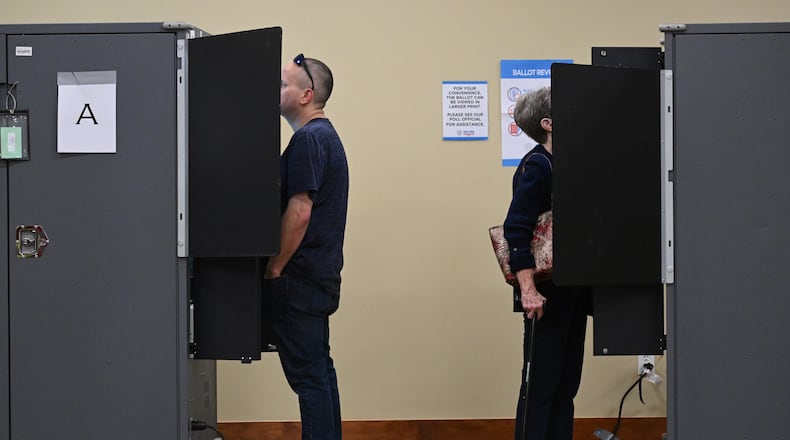This year’s presidential election will be run differently in Georgia than the last one, thanks to a torrent of new laws.
From a ban on handing out water to more election audits and limits on drop boxes, Republican Georgia legislators have changed voting laws every year since Donald Trump lost the 2020 race.
Four months after that vote, lawmakers passed an election overhaul that reined in absentee voting. This year, legislators expanded voter eligibility challenges and added watermarks to ballots.
In addition, the State Election Board sought rule changes for hand counts and election certification requirements before a judge ruled them illegal and unconstitutional.
A response to the 2020 election
Georgia’s rewrite of election laws began as a reaction to the 2020 presidential election, when mass vote-by-mail efforts during the COVID-19 pandemic contributed to Joe Biden’s narrow victory against Trump.
The voting law, Senate Bill 202, focused on limiting absentee voting after Biden won nearly two-thirds of absentee votes cast. The Georgia General Assembly passed the bill along party lines, with Republicans in support and Democrats opposed.
While absentee drop boxes were widely available on government property during the 2020 election, the 2021 law capped absentee ballot drop boxes at one per 100,000 registered voters and restricted them to in-person early voting locations. Ballot drop boxes weren’t offered before 2020.
Voters are no longer able to request absentee ballots entirely online because the law requires voters to use pen and ink to sign an application form, meaning they have to print out the form.
Credit: Gov. Brian Kemp's office
Credit: Gov. Brian Kemp's office
Georgia remains one of 36 states that allows no-excuse absentee voting, so any registered voter can cast an absentee ballot for any reason.
But absentee voters are required to provide more ID, ballot application deadlines are shorter and mass mailings of absentee ballot request forms are restricted.
Absentee voting rates have plunged this year and early voting has surged. About 26% of voters returned absentee ballots in 2020, compared with an estimated 5% of turnout by absentee voting expected this year.
Perhaps most famously, the law banned handing out food and drinks to voters waiting in line, a prohibition parodied in the show “Curb Your Enthusiasm.” Poll workers are allowed to set up self-service water receptacles.
Violations would be punishable as a misdemeanor, with up to a year in jail and a $1,000 fine, but there haven’t been any known prosecutions.
Most of the law has survived court challenges so far, including a lawsuit by the U.S. Department of Justice alleging it violated voting rights.
A federal judge ruled against parts of the law, prohibiting criminal penalties for distributing refreshments as long as they’re outside 150 feet of a polling place, and he banned counties from rejecting ballots of voters who didn’t write their correct date of birth on absentee ballot envelopes.
Those rulings are being appealed and multiple lawsuits over the law could go to trial next year.
A steady stream of new laws
Georgia lawmakers didn’t stop with the 2021 voting law. They’ve returned to the state Capitol each year with more revisions.
In the run-up to this year’s presidential election, legislators emphasized election operations and management.
A new law reinforced the ability of conservative activists to challenge the eligibility of voters, a priority among Republicans who say outdated registrations could be used for fraud.
Credit: Jamie Spaar
Credit: Jamie Spaar
Under the law, voter eligibility challenges should be upheld if a Georgia voter registers in another state, claims a homestead exemption in a different jurisdiction or registers at a nonresidential address. Challenges won’t be considered within 45 days of an election, and they can’t target college students, members of the military and out-of-state government employees who have temporarily moved from Georgia.
County election boards have rejected most voter challenges, including more than 45,000 since July, often citing federal laws that protect voters’ rights against “systematically” removing registrations without detailed evidence.
In addition, another law requires an audit of the vote count with technology that reads the text printed on ballots and recounts them. Manual audits that recount a selection of ballots by hand will also be conducted on the presidential race and at least one other statewide contest.
Each ballot this year is imprinted with a watermark to verify its authenticity when held up to light, according to a new law.
And a third-party presidential candidate, Jill Stein of the Green Party, was added to voters’ choices under a law that requires candidates to automatically appear on the ballot if they’re also on the ballot in at least 20 other states and territories.
In previous years, the General Assembly passed laws prohibiting donations to election offices and empowered the GBI to investigate allegations of election fraud.
State Election Board rules overturned
A Fulton County judge overturned several recent State Election Board rules last week, agreeing with plaintiffs who argued the board abused its authority by effectively making new laws. The Georgia Supreme Court on Tuesday denied the Republican Party’s effort for a quick appeal to reverse the judge’s order.
The rules, passed by the State Election Board’s Republican majority, would have required a hand count of the number of ballots on election night and an undefined “reasonable inquiry” before results are certified.
Credit: HYOSUB SHIN / AJC
Credit: HYOSUB SHIN / AJC
In a separate court order, another Fulton County judge ruled state law requires county election boards to certify election results one week after Election Day. He also found that county election boards are able to review election documents before certification votes.
About the Author
Keep Reading
The Latest
Featured






